February 28, 2011
How to read a long sentence
みなさん、こんにちは!
I will write about grammars today.
When you read a long sentence, watch particles first.
For example (from my former entry in Panda article),
前原誠司外相は18日の記者会見で、
日中関係改善の観点から
東京・上野動物園に中国から貸与されるパンダ2頭が
21日に到着することを歓迎。
(person)は(date)の(interview)で、
(China-Japan relations improvement)の(view point)から
(Ueno zoo)に(China)から(Panda)が
(date)に(arriving)を(welcome)
Let’s break it down a little bit more.
There are three basic Japanese sentence structures and the most important part comes at the end.
①(noun)は(noun)
②(noun)は(adjective)
③(noun)は(verb(intransitive))/(noun)は(object)を(verb(transitive))
The end of the example sentence is “歓迎(する)= to welcome”, so it is ③.
Make it this long example sentence basic.
(person)は(arriving)を(welcome)。
Mr. Maehara welcomes arriving.
Others are additional information. We will see it reversal.Underline parts are added at each stage.
1 (person)は(Panda)が(arriving)を(welcome)。
Mr. Maehara welcomes the Panda Bears arriving.
2 (person)は(Ueno zoo)に(China)から(Panda)が(date)に(arriving)を(welcome)。
Mr. Maehara welcomes the two Panda Bears from China arriving on Feb 21st to Ueno zoo.
3 (person)は(China-Japan relations improvement)の(view point)から(Ueno zoo)に(China)から(Panda)が(date)に(arriving)を(welcome)。
Mr. Maehara welcomes the two Panda Bears from China arriving on Feb 21st to Ueno zoo from the view point of China-Japan relations improvement.
4 (person)は(date)の(interview)で、(China-Japan relations improvement)の(view point)から(Ueno zoo)に(China)から(Panda)が(date)に(arriving)を(welcome)。
On Feb 18th Press Interview, Mr. Maehara welcomes the two Panda Bears from China arriving on Feb 21st to Ueno zoo from the view point of China-Japan relations improvement.
Hope it helps you to understand Japanese sentence structures.
February 26, 2011
パンダ Panda Bears
みなさん、こんにちは!
A pair of Panda Bears from China came to Tokyo Ueno Zoo on Feb. 21st.It’s been about three years since the last Panda Bear dead.
Today's topic is Panda !
Foreign Minister Seiji Maehara welcomes the two Panda Bears, which are rent from China to Tokyo Ueno zoo, from the view point of China-Japan relations improvement.
On that basis he also points out “their rental rate is pretty expensive”.
These tow Panda Bears lease total payment is about 7.9M yen per year.
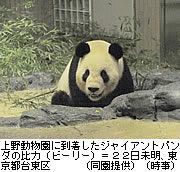
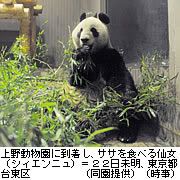
時事ドットコム
2月21日に中国からパンダが東京上野動物園に約3年ぶりに来ました。
中国(ちゅうごいう): China
上野(うえの)動物園(どうぶつえん): Ueno Zoo
約(やく): about
3年(ねん)ぶり: it has been 3 years
cf. ひさしぶり: it has been long time (ひさしい=long time)
今日はそのパンダの話題です。
今日(きょう): today
話題(わだい): topic
前原誠司外相は18日の記者会見で、日中関係改善の観点から東京・上野動物園に中国から貸与されるパンダ2頭が21日に到着することを歓迎。
前原(まえはら)誠司(せいじ)外相(がいそう):
Foreign Minister Seiji Maehara
記者(きしゃ)会見(かいけん): Press interview
日中(にっちゅう)関係(かんけい): Japan-China relations
改善(かいぜん): improvement
~の観点(かんてん)から: from the viewpoint that ~
東京(とうきょう): Tokyo
貸与(たいよ)される: (passive) be lent
2頭(とう): counter for bigger animals
到着(とうちゃく): arrive
歓迎(かんげい): welcome
そのうえで「結構高いんですよね、賃貸料」とも指摘した。
そのうえで: as far as ・・・concerned
結構(けっこう)高(たか)い: pretty expensive
賃貸(ちんたい)料(りょう): rental rate
指摘(してき)した: pointed out
このパンダ2頭の年間リース料は計約7900万円。
年間(ねんかん): per year
リース料(りょう): lease payment
計(けい): total
7900万(まん)円(えん): 79,000,000 yen
MSN産経ニュース
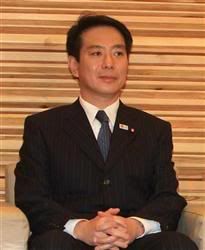
Seiji Maehara, Foreign Minister
February 23, 2011
US, Egypt and Japan Top アメリカ・エジプト・日本のトップ
みなさん、こんにちは!
Today it is about the tops of the US, Egypt and Japan.
President Mubarak had been kept for 29 years of very long authoritarian government.
On the other hand, the US President is elected once every four years.
And in Japan, the prime minister has been kept changing…
It is a little bit difficult to remember all of the prime minister in Japan.
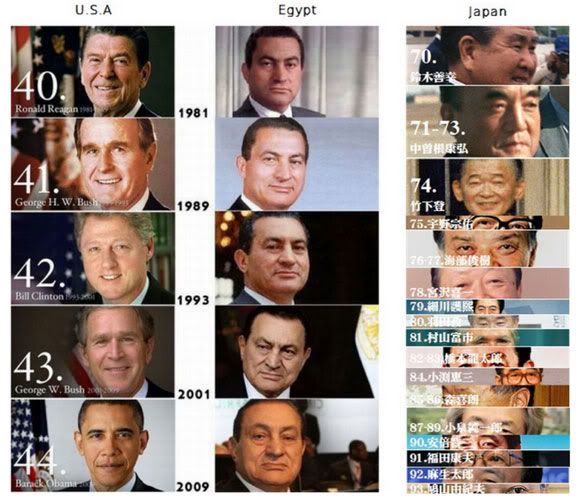
あごひげ海賊団
今日はアメリカ・エジプト・日本のトップについてです。
今日(きょう): today
~について: about ~
29年もの長い間独裁政権を維持していたムバラク大統領。
29年(ねん)も: 29 years, “も” = emphasis
長(なが)い間(あいだ): during long period
独裁(どくさい)政権(せいけん): authoritarian government
~を維持(いじ)していた: has been kept, preserve,
大統領(だいとうりょう): president
一方、四年に一度の選挙により大統領が決まるアメリカ。
一方(いっぽう): on the other hand
四年(よねん)に一度(いちど): once every four years
選挙(せんきょ): election
~により: by
~が決(き)まる: has been selected
そして、めまぐるしく首相(内閣総理大臣)がコロコロと変わる日本……。
そして: and then
めまぐるしく: conterminously
首相(しゅしょう): prime minister
内閣(ないかく)総理(そうり)大臣(だいじん): prime minister (in Japan)
コロコロと変(か)わる: keep changing
日本の首相全員を覚えるのはちょっと無理ですね!
全員(ぜんいん): all of
覚(おぼ)える: memorize, remember
無理(むり): it is impossible, cannot
February 21, 2011
セクシースモウ Sexy Sumo
みなさん、こんにちは!
Today I will write about TV CM of Japanese car in Canada.
Subaru new TV CM “Forester” started to get air-play in Canada.
Lovable Sumo wrestlers come on to the CM which became popular.
Subaru Canada has produced this CM and its title is “Sexy Sumo”.
Mischievous rather than hardy Sumo wrestlers with Forester are in the CM.

Yahoo News
今日はカナダでの日本車のテレビCMについての話題です。
今日(きょう): today
日本車(にほんしゃ): Japanese car
話題(わだい): topic
スバルが、カナダでオンエアを開始した『フォレスター』の新CM。
スバル: Subaru (Japanese automotive company)
オンエア: airplay
開始(かいし)した: started
新(しん)CM: new CM
相撲の力士が登場する愛嬌たっぷりの内容が話題となっている。
相撲(すもう)力士(りきし): Sumo wrestler
登場(とうじょう)する: come on to
愛嬌(あいきょう): lovable, winsome
たっぷり: a lot, full
内容(ないよう): content
話題となっている: become a popular topic
このCMは、スバルカナダが製作したもの。
制作(せいさく): produce
タイトルは「セクシースモウ」だ。
フォレスターとともに、逞しいというよりはお茶目な力士が登場する。
逞(たくま)しい: strong, diesel, hardy
AというよりB: B rather than A
お茶目(ちゃめ): full of fun, mischievous, gnomish
February 19, 2011
寿司USBメモリー Sushi USB Memory
みなさん、こんにちは!
We had snow again on Feb 14th night.
It is still very cold.
One of the most well-known Japanese food in overseas must be Sushi.
Seems like those Sushi USB memories are sold.
It would be good for souvenirs.
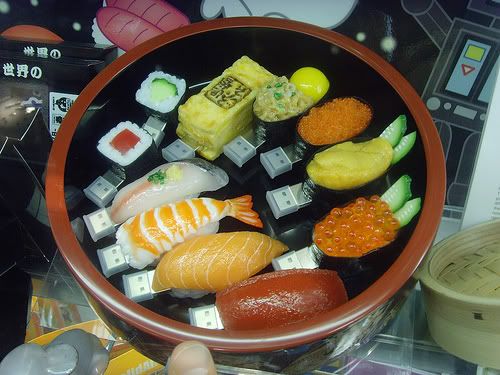
Rocket News 24
東京は2月14日夜にまた雪が降りました。
東京(とうきょう): Tokyo
2月(にがつ)14日(じゅうよっか): Feb 14th
夜(よる): night
また: again
雪(ゆき)が降(ふ)りました: it snowed.
まだまだ寒いです。
まだまだ: still(emphasis)
寒(さむ)い: cold
世界で有名な日本の食べ物と言えば寿司ですね。
世界(せかい)で: all over the world
有名(ゆうめい)な: famous, well known
日本(にほん)の食(た)べ物(もの): Japanese food
~と言(い)えば: speaking of ~
(raises thoughts that come to mind when speaker hears
topics in a conversation)
こんなUSBメモリーが売っているようです。
売(う)っている: be sold
~ようです: seems like, looks like
おみやげにどうですか?
February 14, 2011
Happy Valentine's Day!
みなさん、こんにちは!
We will read an article about Valentine ’s Day because it is Valentines’ Day today.
Google announced on Feb 10th their search result ranking of the terms “Valentine, Recipe” before Feb 14th Valentine’s Day.
According to it, the most searched word related to Valentine’s Day sweets from Feb 1st to 8th was “macaroon”.
Start with "Macaroon", the followings are “Gateau cocolat”, “Ganache” and “Fondant au chocolat”.
Macaroon looks difficult to make at first glance, but Google comments that “the number of people want to try to make it is increasing” because how to make it easy is able to be searched.

Macaroon Recipe
今日はバレンタインデーですので、バレンタインデーについての記事を読んでみましょう。
今日(きょう): today
記事(きじ): article
読(よ)んでみましょう: let’s read
グーグルは2月10日、2月14日のバレンタインデーに備え、「バレンタイン レシピ」という言葉による検索結果のランキングを発表した。
~に備(そな)え: preparing for ~
言葉(ことば): word, term, vocabulary
検索(けんさく)結果(けっか): search result
~を発表(はっぴょう)した: announced ~
これによると、2月1日から8日にかけてGoogleで最も検索数が多かったバレンタイン関連の菓子は「マカロン」だった。
~による: according to
最(もっと)も: the most
検索数(すう): the number of searching
バレンタイン関連(かんれん): related to Valentine’s day
菓子(かし): sweets+snacks
マカロン以下、「ガトーショコラ」、「生チョコ」、「チョコレートケーキ」、「フォンダンショコラ」が続いた。
以下(いか): the following
~以下・・・が続(つづ)いた: start with ~ followings ・・・
一見作るのが難しそうなマカロンだが、Googleでは簡単に作るレシピが検索が可能になっており、同社では「自分で作ってみる人が増えているのではないか」とコメントしている。
一見(いっけん): at first glance, seemingly
作(つく)るのが難(むずか)しそう: looks difficult to make
簡単(かんたん)に作(つく)る: make easily
検索可能(かのう)になっており: can search
~になっており=~になっていて: ~になっている connective form
同社(どうしゃ): the company = Google
自分(じぶん)で: by oneself
作(つく)ってみる: try to make
自分で作ってみる人(ひと): one who make by themselves
増(ふ)えている: increasing
~ではないか: it would probably be ~
~とコメントしている: comment on ~
February 12, 2011
建国記念日と雪 National Foundation Day & Snow
みなさん、こんにちは!
Yesterday, Feb 11th was a national holiday.
It was National Foundation Day.
It was a very cold day and it had been snowing from morning in Tokyo resion.
And it became sleet and rain, now you can see the moon tonight (Feb 12th)
It seems like it is going to be a good weather tomorrow.
There is a flu going around, please take care!
Sorry I cannot update my Blog as I have been very busy.
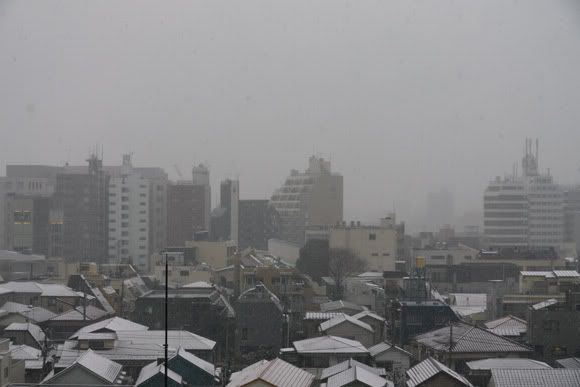
Rocket News 24
昨日2月11日は祝日でした。建国記念日です。
昨日(きのう): yesterday
祝日(しゅくじつ): public holiday
建国(けんこく)記念日(きねんび): National Foundation Day
とても寒い日で、東京地方も朝からずっと雪が降っていました。
寒(さむ)い日(ひ): very cold day
東京(とうきょう)地方(ちほう): Tokyo region
朝(あさ)からずっと: since morning
雪(ゆき)が降(ふ)っていた: it has been snowing
そしてみぞれになって、雨になり、今(2月12日夜)はやんで月が見えます。
そして: and then
みぞれ: sleet, snowy rain
やむ: stop (rain, snow, wind)
月(つき)が見(み)えます: can see the moon
明日はいい天気になりそうです。
明日(あした): tomorrow
いい天気(てんき): nice weather
~そう: looks like, seems like
インフルエンザがはやっていますのでみなさん気をつけて!
はやっている: is going around
気(き)をつけて: please take care
忙しくてなかなかBlogが更新できなくてごめんなさい。
忙(いそが)しくて: because I am busy
なかなか+Verb Negative: it takes time, it is difficult to do
更新(こうしん)できない: cannot up date
Subscribe to:
Posts (Atom)



